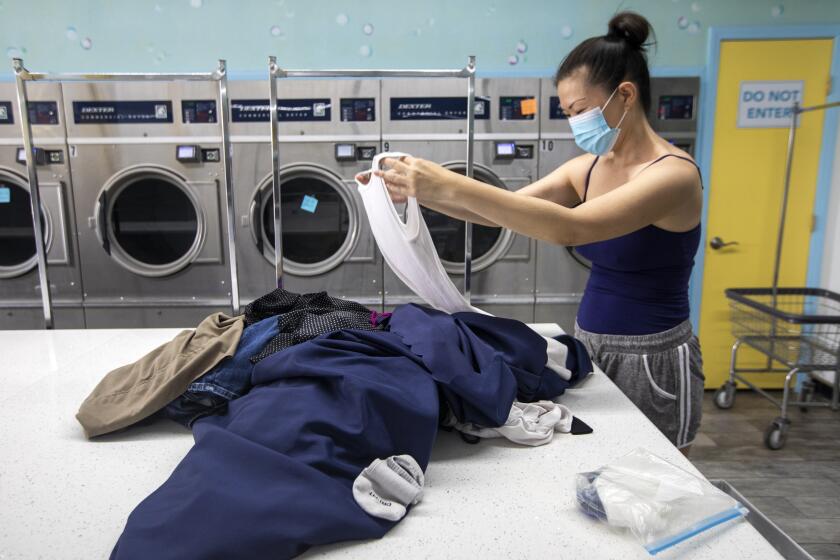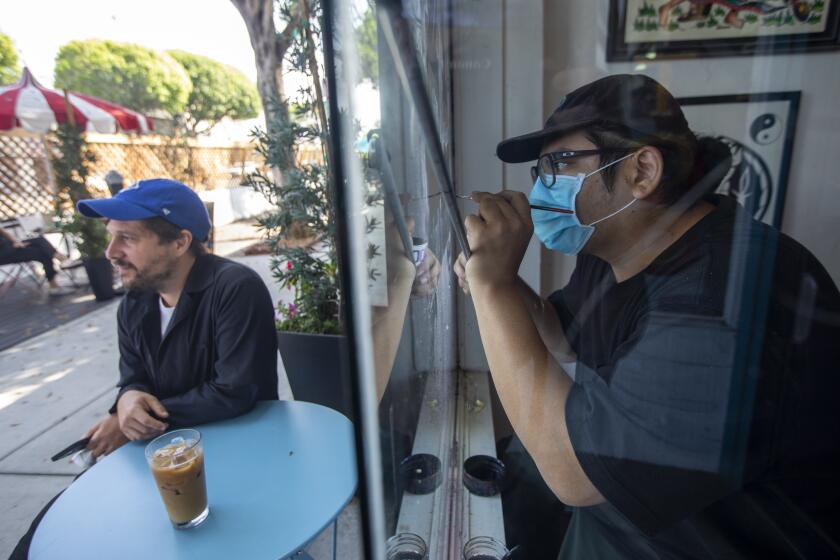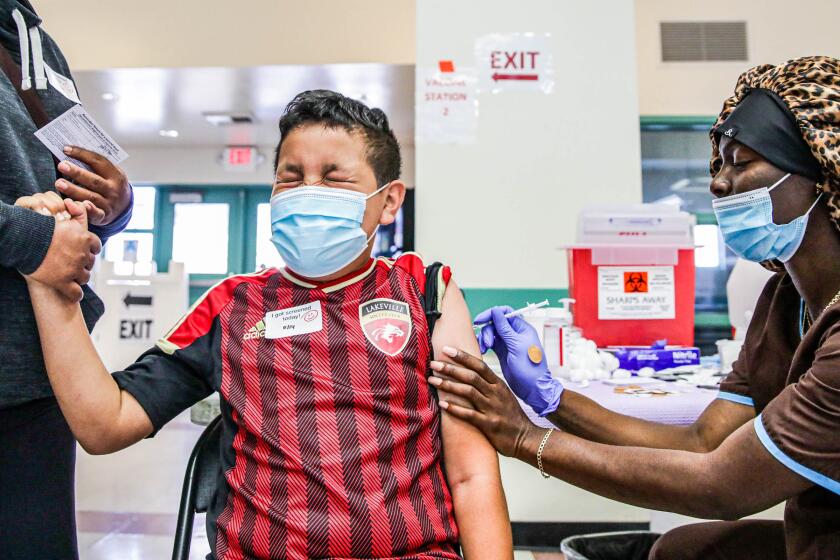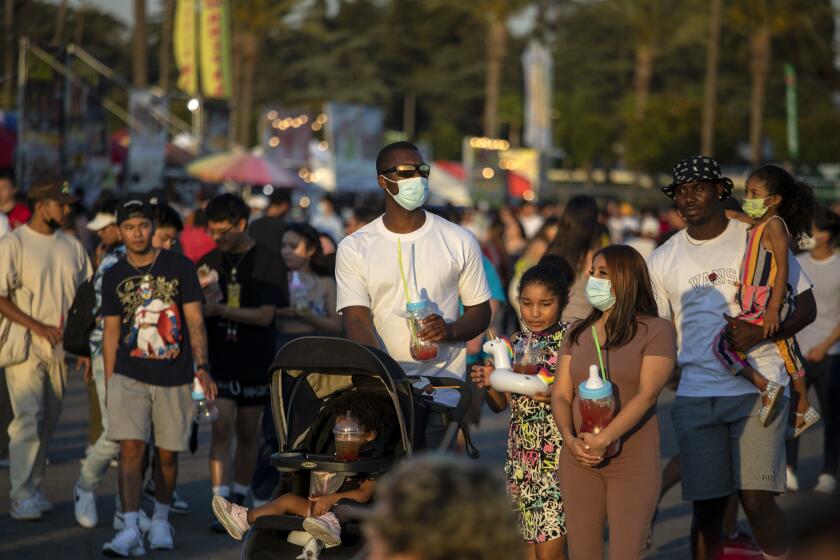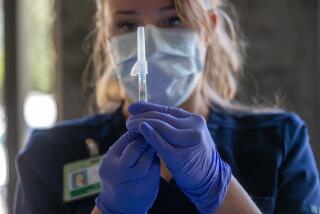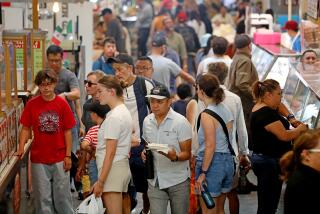Vaccines are incredibly effective against Delta variant. So why do we need to wear masks indoors?
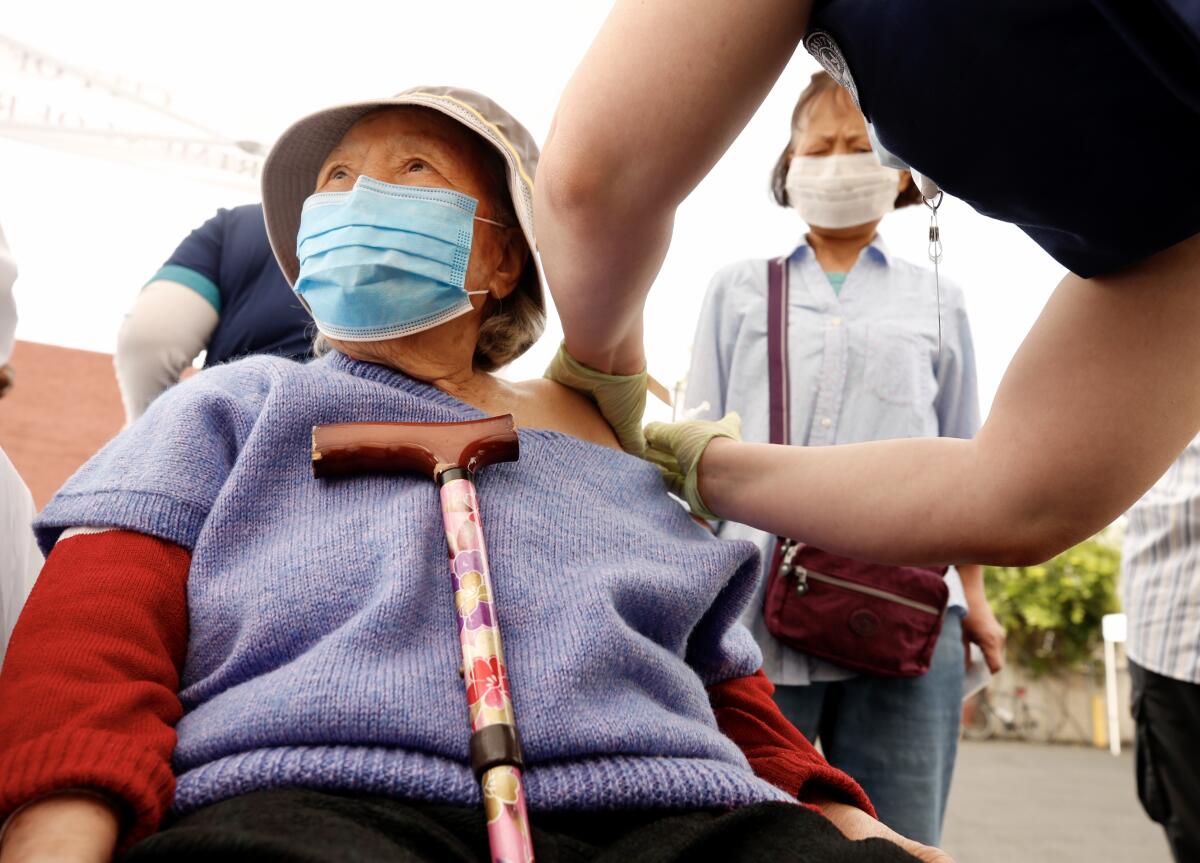
- Share via
Health experts agree the COVID-19 vaccines have proved to be extremely effective against the virus, including providing protection from the highly contagious Delta variant.
Those safeguards are highlighted by the percentage of people who are now testing positive for the coronavirus in Los Angeles County, where more than 10,000 new cases have been reported in the last week. In an alarming spike in cases, 99% of new infections involve people who have not been vaccinated.
And now, in the wake of that increased transmission, local officials are requiring not only the unvaccinated but also those who have been inoculated against the disease to wear masks in public indoor settings.
Why?
L.A. County now requires masks in indoor public places, opening a new battle line as the coronavirus is rising significantly among the unvaccinated.
All those hospitalized for COVID-19 in L.A. County’s public hospitals have not been fully vaccinated
L.A. County’s massive public hospital system has not had to hospitalize anyone for COVID-19 who has been fully vaccinated, Health Services Director Dr. Christina Ghaly said.
“We have not admitted any single person for COVID who is fully vaccinated — with either the J&J, Pfizer or Moderna vaccines,” Ghaly told the county Board of Supervisors last week.
L.A. County’s public hospital system has a vast reach and primarily serves people especially vulnerable to COVID-19. There are four county-run hospitals.
Those hospitalizations could be mitigated by the vaccines, health experts say.
“The vaccines are extraordinarily effective (even against the delta variant),” tweeted Dr. Monica Gandhi, infectious diseases expert at UC San Francisco.
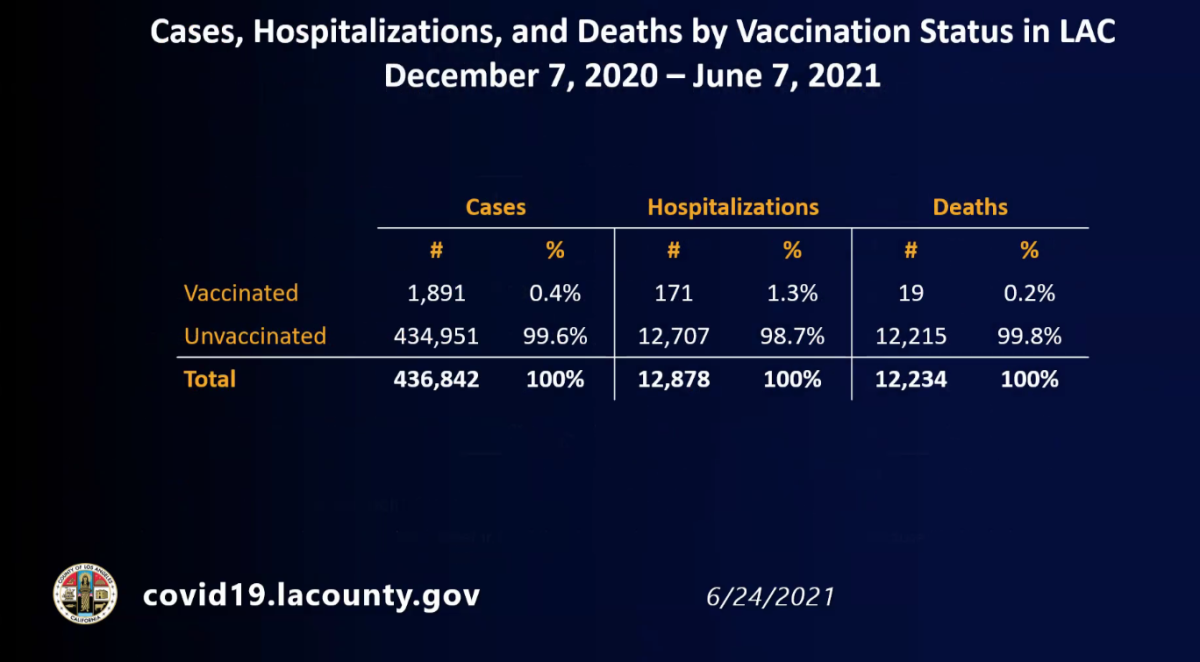
99.8% of COVID-19 deaths in L.A. County have been among unvaccinated people
Between Dec. 7 and June 7, unvaccinated people in L.A. County made up 99.6% of the region’s coronavirus cases, 98.7% of COVID-19 hospitalizations and 99.8% of deaths.
San Diego County has reported similar numbers.
Residents there who are either unvaccinated or partly vaccinated represent 99.1% of coronavirus cases, 99.88% of COVID-19 hospitalizations and 99.8% of deaths.
‘Anything is on the table if things continue to get worse, which is why we want to take action now,’ the L.A. County health officer said.
Of fully vaccinated people in L.A. County, 0.06% subsequently tested positive for the virus
In Los Angeles County, about 4.67 million residents have been fully vaccinated.
Of them, 0.06% have subsequently tested positive; 0.004% were later hospitalized for COVID-19; and 0.0004% died.
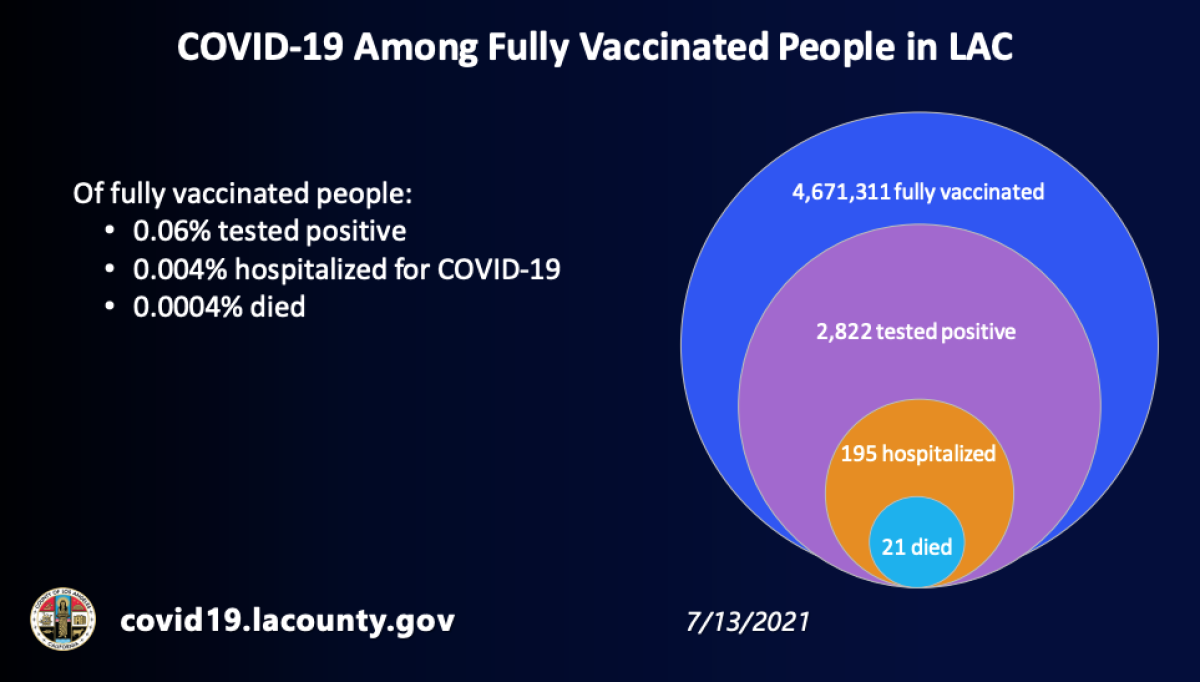
The vaccines are as effective against the Delta variant as other strains
Among L.A. County coronavirus cases that were further analyzed to identify its strain in June, only a small percentage were among fully vaccinated people.
Officials said that 89% of identified Delta variant cases in June were among people who weren’t fully vaccinated.
The results were similar to the Alpha variant: 91% of identified cases were among people who weren’t fully vaccinated.
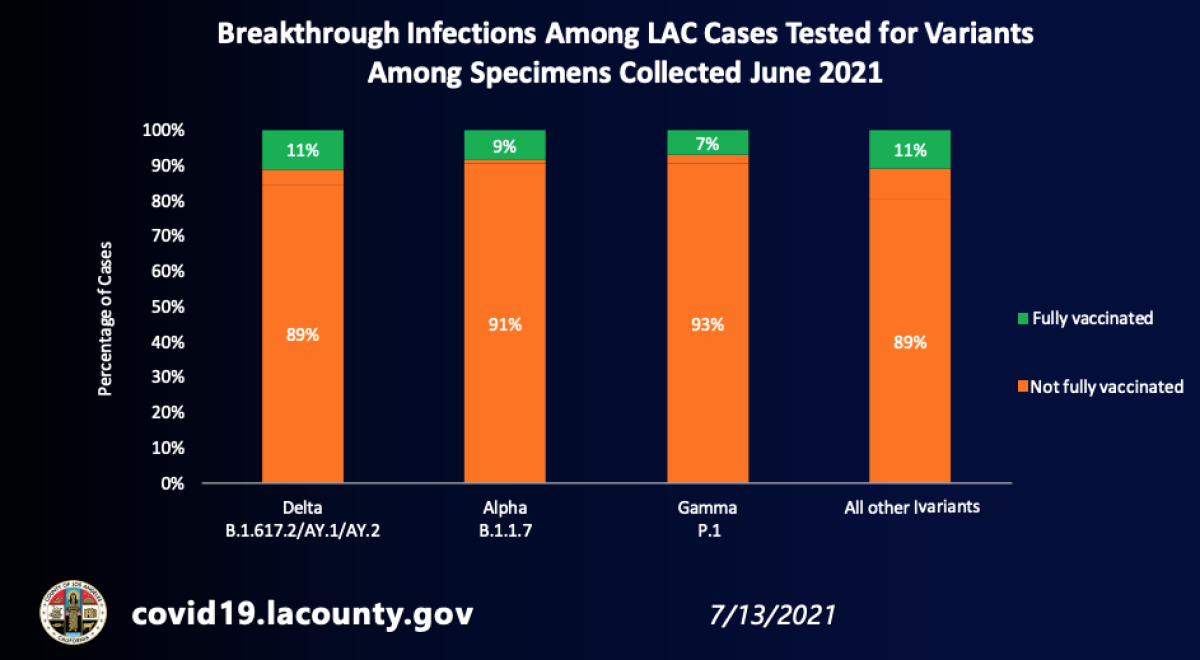
Well-done studies elsewhere point to high effectiveness against Delta
Data from Britain cited by Dr. Anthony Fauci, the U.S. government’s top infectious-diseases expert, say that the two-dose course of the Pfizer-BioNTech vaccine is 96% effective in preventing hospitalization from COVID-19, 88% effective in preventing symptomatic infection and 79% effective in preventing lab-confirmed infection. Experts believe the Moderna vaccine — because it’s based on the same technology as Pfizer’s — is similarly effective.
Fauci also expressed confidence in the Johnson & Johnson vaccine’s effectiveness. The Johnson & Johnson vaccine uses technology similar to one used in the AstraZeneca vaccine, which studies in Britain show is 92% effective against hospitalization and 60% effective against either symptomatic disease or lab-confirmed infection.
Invariably, there have been scattered reports that have occasionally raised questions about whether vaccines have lowered effectiveness against the Delta variant, including one that emerged out of Israel suggesting that the effectiveness of vaccines available there to protect against symptomatic illness had fallen to 64%, although they remained 93% effective in preventing hospitalization.
The differing results of the Israeli report may be caused by different methodologies, such as rigorously testing vaccinated people for a coronavirus infection even though they had no symptoms, while other studies might test only those who are visibly ill, said UCLA epidemiologist and infectious diseases expert Dr. Robert Kim-Farley.
“Bottom line, however, is that all these studies continue to show very good efficacy against severe disease and death,” Kim-Farley said. “The vaccines continue to do what we need them to do most.”
In addition, the Israeli report reviewed just 300 patients, and small studies can be inaccurate, said Gandhi, the infectious diseases expert at UC San Francisco. Studies from Britain, Canada and Singapore — reviewing records of many more people — showed 80% to 90% vaccine effectiveness against any symptomatic infection and 93% to 96% effectiveness against severe disease.
A growing contingent of medical experts is questioning the conventional wisdom that healthy children should get COVID-19 shots as soon as possible.
How can children be protected if they’re too young to be vaccinated for now?
Children under the age of 12 do not have access to vaccines for now, and it’s important that as many adults around them get vaccinated, Gandhi tweeted.
“The best thing we can do for children right now is to get as many adults vaccinated as possible while young children clinical trials of [vaccines] are ongoing, especially anyone who will be teaching children or sending them to school (e.g. teachers/parents),” Gandhi wrote.
Young children already are less likely to contract the coronavirus because they have far fewer proteins called ACE2 receptors in their noses that the coronavirus needs to access to infect the body.
Officials described the mask mandate as a minimally disruptive tactic to blunt rapidly rising coronavirus transmission. But does it make any sense?
So why wear a mask?
L.A. County officials say there’s a real need to take action now. Though infections and serious COVID-19 illness are still only a fraction of what was seen over the fall and winter, daily coronavirus cases are now six times what they were on June 15, when California fully reopened, and COVID-19 hospitalizations have doubled since then.
In its reopening last month, California implemented a statewide honor system: Unvaccinated people still had to wear masks in indoor public spaces, even though businesses were under no obligation to verify their inoculation status.
L.A. County officials are now worried that unvaccinated people instead responded by not masking up in required settings. And with cases and hospitalizations growing, authorities say they hope reinstituting masking as a social norm will help reduce disease transmission.
“We’re not where we need to be for the millions at risk of infection here in Los Angeles County, and waiting to do something will be too late given what we’re seeing now,” said Dr. Muntu Davis, the county’s health officer.
In essence, they hope requiring everyone to wear masks indoors will force the unvaccinated to do so, giving them more protection.
More to Read
Sign up for Essential California
The most important California stories and recommendations in your inbox every morning.
You may occasionally receive promotional content from the Los Angeles Times.
